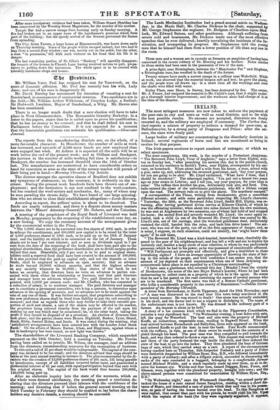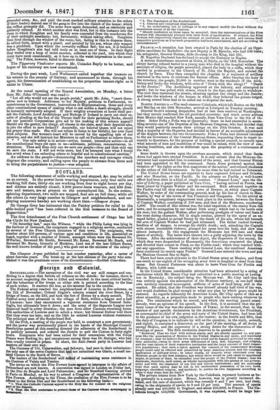IRELAND.
The most stringent measures are now taken to enforce the payment of the poor-rate in city and town as well as rural districts, and so far with the best possible results. No excuses are accepted, distraints are freely resorted to, and the military are employed if necessary. The Carlow Sen- tinel reports a seizure of property to enforce a demand for poor-rate, at Ballochmoyler, by a strong party of Dragoons and Police: after the sei- zure, the rates were freely paid.
Large bodies of military are concentrating in the disorderly districts in Ireland: several regiments of horse and foot are mentioned as being in motion for that purpose.
The Irish papers continue to report numbers of outrages; of which we select specimens. The most conspicuous, this week, is the murder of a Protestant clergyman. " The Reverend John Lloyd, Vicar of Aughrim," says a letter from Elphin, writ-
ten on Sunday last, "after preaching his sermon this day in the parish-church,
returned to his residence in Smith's Town, near Elphin, accompanied by his ser- vant, on horseback. When about half a mile from his house, a man, armed with a gun, came up, and, addressing the reverend gentleman, said, Say your prayers, for you are going to be shot.' Mr. Lloyd exclaimed, ' What have I done, that I should be murdered !' The miscreant replied, ' You put out a tenant two years ago on your estate in Leitrim; and I tell you, say your prayers, for your time is come.' The ruffian then levelled his gnu, deliberately took aim, and fired. Two balls entered the chest of the unfortunate gentleman, who fell a lifeless corpse upon the road. The servant rode on to give the alarm. The murderer escaped." A correspondent of the Times, writing from Strokestown, gives a somewhat different account; and adds some particulars respecting Mr. Lloyd's character. " Yesterday, the 28th, as the Reverend John Lloyd, Smith Hill, Elphin, was re- turning, after having performed divine service at Kilmore Church, of which he was the officiating minister, when about two miles distant from his own residence, he was met at Aughamore by two assassins, one of whom laid hold of and stopped his horse; the second fired and severely wounded Mr. Lloyd; the same again re- loaded, took a child (a son of the Reverend Mr. Percy) that was seated by Mr. Lloyd's side, out of the carriage, shot the wretched gentleman dead, deliberately resented the child, handed him the reins, and bade him drive home ! The ser- vant, who was one of the party, ran off on the first appearance of danger, and, as is usual, I suppose, on such occasions, could not identify, but 'might know them again' if he saw them, " The Reverend Mr. Lloyd was a kind-hearted, benevolent man, charitably dis- posed to the poor of his neighbourhood; and has left a wife and son to deplore his untimely end, besides a large circle of near relatives, to whom he was particularly generous; which he had in his power, as he was possessed of considerable affluence. " Will Parliament act promptly and effectively, and give a deathblow to these brutalizing sights? I have an average opportunity of knowing the state of feel- ing in the minds of the people, and with confidence I can assure you, that the amount of joy depicted on their countenances when one of these sickening an- nouncements takes place is not equalled by a Christmas merrymaking." "I have seen a gentleman who returned this day [Monday] from the vicinity of Strokestown, the scene of the late Major Mahon's murder, where he had been
endeavouring to collect rents on a property of which he is the agent. He states that he saw a list posted on the road containing the names of several persons who are to be murdered. The first name was that of a Roman Catholic gentleman, who holds a considerable property in the county of Roscommon."—Dublin Corre- spondent of the Morning Chronicle.
A letter from Borrisokane, in North Tipperary, dated the 29th November, says —"A man was discovered on the road near this town today murdered in the most brutal manner. He was stoned to death! One stone was actually embedded in his skull, and the doctor had to use a nippers in dislodging it. The name of the unfortunate man is not known. He was dressed in the ordinary garb of a farmer. An inquest is about to be held." A story of a too common kind, which we find in the Tipperary Constitution, contains a very significant fact. " On Wednesday evening, a boat laden with oats, left the quay for Waterford. The boat and oats were the property of Michael Keeffe, an industrious, respectable man, residing in Bagwell Street. When the boat arrived between iurnchurch and Ballydine, three men appeared on the bank, and ordered Keeffe to pull the boat in near the bank. Poor Keeffe remonstrated with the ruffians, in vain, as one of them swore he would blow the contents of a pistol through his head. The poor man was thus compelled to pull towards the bank, and was then ordered to throw a rope out. This request was complied with; and three of the party fastened the rope inside the ditch, and then ordered the crew of the boat to go into the locker. They then plundered the boat of thirteen bags of oats, which they carried away on a cart. A report of the circumstances having reached here on 'Thursday, Sub-Inspector Fosberry and a party of Police were forthwith despatched by William Ryan, Esq., RN., who followed immediately
with a party of military; and after a diligent search, succeeded in discovering ten sacks of the oats concealed in a haggard, belonging to a comfortable farmer named Michael Walshe and a stack regularly made up over them, so as to de-
ceive the keenest eye. ,Valshe and four men, named Duggan, Ryan, Foran, and Gleason, were together with the plundered property, brought into town; and the above-named persona were committed for examination by William Ryan, Esq., RN." "On Wednesday night," says the Westmeath Guardian," an armed party at- tacked the house of a man named James Naughton, residing within a short dis- tance of Monte, and demanded a ease of pistols which they said was in his
posses- sion, on pain of having the house burned over his .hwd. To this NauggOuse:1; once replied, that sooner than part with his pistols, he would yield his life. Upon which the captain of the band (for they were regularly organized, it appears, grounded arms, &c., and paid the most marked military attention to the orders of their leader) desired one of the gang to fire into the thatch of the house: which the ruffian promptly did. The arms were again demanded, and as resolutely and gallantly refused. At which another shot was fired, but in this instance into the room in which Naughton and his family were concealed from the murderous fire of their midnight assailants; but, fortunately, without taking effect. Naughton then fired through the window of the room; but, failing in this to disperse them, he sallied forth, armed with a pistol, and assisted by his son, whose only weapon was a pitchfork. Upon which the cowardly ruffians fled; but not, it is believed before Naughton's aim bad told truly on at least one of them. In their flight they waded over a heap of moist manure, collected in the yard, into which they mast have sunk considerably, as it bore up to the waist impressions in the morn- ing," The Police, however, failed to discover them.
The Tipperary Vindicator reports Mr. Uniacke Bayly to be better, and hopes of his recovery are now entertained.
During the past week, Lord Wallscourt called together the tenants on his estates in the county of Galway, and announced to them, through his agent, his determination of establishing on his properties tenant-right as it exists in Ulster.
At the usual meeting of the Repeal Association, on Monday, a letter from Mr. John O'Connell was read- " Let all who would not see the people perish," quoth Mr. John, "exert them- selves now in Ireland. Addresses to her Majesty, petitions to Parliament, re- monstrances to the Government, instructions to Representatives, these and every other constitutional means of making what is not unlike a death struggle, should be instantly universally adopted. If their weighty avocations at home shall per- mit the Catholic Lord Archbishops and Bishops of Ireland to carry out their re- solve of pleading at the foot of the Throne itself for their perishing flocks, should not our patriotic Corporations give aid to the making of this solemn appeal? Should not the gentry, the clergy, all classes in the state, send their deputies also, to join the effort to save Ireland ? Assuredly, our beloved Queen will not reject the prayer thus made. She will not refuse to listen to her faithful, her ever loyal Irish subjects. Her woman's heart will be moved by the appalling tale of our miseries, and she will instruct her Ministers to call on Parliament to relieve them.
• • • Our only safety is in action—action, instant, immediate action—in all the constitutional ways yet open to us—addresses, petitions, remonstrances, in- structions. Thus and thus only can we save oar people—thus and thus only can we save the state. I will not write more, lest I be betrayed into what I would fain avoid when I am exhorting others to hopeful and to constitutional exertion." An address to the people—denouncing the murders and outrages which disgrace the country, and calling upon the people to abstain from them and to bring the perpetrators to justice—was adopted.



































 Previous page
Previous page